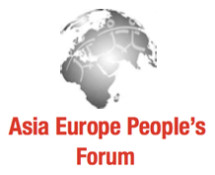Ideas into movement
Boost TNI's work
50 years. Hundreds of social struggles. Countless ideas turned into movement.
Support us as we celebrate our 50th anniversary in 2024.

The Asia Europe Peoples' Forum puts forward detailed recommendations on how future ASEMs can become more accountable, transparent and relevant in meeting the needs of the people of Asia and Europe.

The Asia Europe People’s Forum (AEPF) was launched in 1996 in Bangkok alongside the first ASEM summit. AEPF is a network of people’s organisations, coalitions, NGOs, academics and trade unions representing citizens and parliamentarians, who are working in different ways for social, economic, environmental and political justice across, and within Asia and Europe.
Since it began, AEPF has created new political spaces for dialogue, solidarity, action and has developed creative and realistic recommendations and strategies to address the challenges emerging from both regions.
As this critical conference reflects and takes stock of current and future ASEM processes, this briefing sets out some of AEPF’s recommendations and ideas for future ASEM’s to become more accountable, transparent, relevant and influential in meeting the needs and aspirations of the people of Asia and Europe.
We are here to understand how global current crises can lead to opportunities with the renewal and regeneration of demands for social justice. Charles Santiago MP, Malaysia, AEPF7 Beijing
1. An Accountable ASEM
Although ASEM is focussed on informal dialogue, the elected Heads of State and Ministers who participate in ASEM are still accountable to those they represent. As very little is known at the national level about the nature of ASEM discussions, the agenda or outcomes, even amongst parliamentarians and MPs (including the European Parliament), it is difficult to ensure accountability. ASEM needs to democratise its process, policy and practice.
2. A Transparent ASEM
Alongside enhancing co-operation frameworks, ASEM has the potential to become an important catalyst for joint planning and actions together with other international forums such as the UN and WTO. However, if decision making and discussions at ASEM remain opaque, then any outcomes or discussions will lack credibility and legitimacy. ASEM needs to put accountability to people at the core of their activities and make the process more transparent and therefore more accessible to people citizens.
3. A Relevant and Influential ASEM
While countries that comprise ASEM make up well over 60% of the world’s population, to date the agenda has been dominated by interests based on narrow discussions and pre-determined debates around security, economic and financial policies. There is a strong consensus growing across Asia and Europe that the dominant neo-liberal approach of the last decades – based on deregulation of markets, trade liberalisation, increasing the power of multinational corporations and opening up public services to the private sector – has failed to meet the basic needs and rights of all citizens.
The EU’s 2006 ‘Global Europe’ trade strategy exemplifies this approach and similar policies of many Asian governments. National debts are unsustainable, public services are being undermined, companies are being given huge concessions to access raw materials and new markets, while workers rights continue to be eroded.
In both Europe and Asia the political and social consequences have been clearly documented – an increase in social exclusion and marginalisation of women, environmental devastation and a hollowing out of democratic accountability as elites make decisions and implement policies with little or no scrutiny from citizens.
At worst, the current economic development model further embeds authoritarian regimes that treat citizens’ rights with impunity. This democratic deficit, combined with increasing poverty and inequality is creating the conditions for growing social unrest and resistance.
4. An Ambitious ASEM
2010 is a year of historical importance, bringing into sharp focus the severe poverty, inequalities and injustice experienced by people of both regions. Regional architectures, political relations and trading patterns are being reshaped, national elections are taking place in many member countries and multi-lateral strategies are needed to mitigate the overlapping and prolonged social, economic and environmental crises. These crises have illustrated the deep links, connections and inter-dependence between Asia and Europe.
ASEM8 is a unique opportunity to initiate dialogue for change based on an honest assessment of these crises, and for developing creative and bold solutions that can transform our social, economic and political futures.
5. An Equal ASEM
Participation and involvement of some of the newer members and/or poorer countries is limited due to a lack of resources, technical expertise and institutional knowledge amongst members. There are 28 European members and 17 Asian members of ASEM and therefore equality between Asian and European members in agenda setting, participation, and follow up between summits becomes even more essential. ASEM should ensure it facilitates full involvement of all member countries.
6. A Challenging ASEM
4. An Ambitious ASEM Some members of ASEM are governed by authoritarian regimes or are countries in which there are widespread and documented human rights violations. Despite the potential tensions and sensitivities, ASEM needs to find mechanisms within its informal approach in which difficult issues can be raised and countries can be both challenged and supported, to introduce democratic and accountable reforms inline with agreed international agreements and legislation – otherwise it risks becoming complicit in abuses and failing the women and men in those countries who remain voiceless and unrepresented.
In summary, to ensure a more equal and just Asia and Europe, future ASEM’s need to:
Contact Details
Nicolas van Nuffel, CNCD - 11.11.11. Brussels: nicolas.vannuffel@cncd.de
Pietje Vervest, Coordinator for Europe, AEPF-IOC, Transnational Institute: pietje.vervest@tni.org
Tina Ebro, Coordinator for Asia, AEPF-IOC, Institute for Popular Democracy: cgebro@gmail.com
See the AEPF website for more information: www.aepf.info